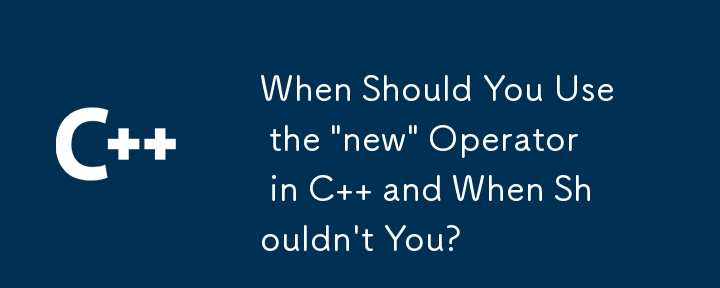When Should You Use the 'new' Operator in C and When Shouldn't You?

When to Utilize "new" and When Not to in C
In C , the usage of the "new" operator plays a crucial role in memory management and object instantiation. Understanding when to employ it is essential for effective coding.
When to Use "new"
- Object Persistence: When you require an object to exist beyond its scope, employ "new." The "delete" operator will dispose of the object after use. This is necessary to prevent automatic object destruction when the scope ends.
- Array Allocation: Dynamically sized arrays cannot be allocated in-place or on the stack. "new" enables the allocation of variable-sized arrays at runtime.
When Not to Use "new"
- Simple Object Instantiation: For basic objects that should be discarded after their scope ends, direct instantiation without "new" is sufficient. The object will be automatically destroyed upon exiting its scope.
- In-Place Allocation within Classes: Member variables within classes are implicitly allocated on the heap or stack based on the containing object's location. "new" is not needed for in-place allocation within classes.
Example:
Consider the following code:
Point p1 = Point(0, 0); // Instantiation without "new" Point* p2 = new Point(0, 0); // Instantiation with "new"
- p1 will undergo automatic destruction when its scope ends.
- p2 will remain allocated on the heap until the delete operator is used.
Conclusion:
Understanding when to use and not use "new" in C is essential for efficient memory management and object lifecycle control. By following the guidelines discussed, you can effectively handle dynamic object creation and avoid potential memory leaks or scope-related issues.
The above is the detailed content of When Should You Use the 'new' Operator in C and When Shouldn't You?. For more information, please follow other related articles on the PHP Chinese website!

Hot AI Tools

Undresser.AI Undress
AI-powered app for creating realistic nude photos

AI Clothes Remover
Online AI tool for removing clothes from photos.

Undress AI Tool
Undress images for free

Clothoff.io
AI clothes remover

AI Hentai Generator
Generate AI Hentai for free.

Hot Article

Hot Tools

Notepad++7.3.1
Easy-to-use and free code editor

SublimeText3 Chinese version
Chinese version, very easy to use

Zend Studio 13.0.1
Powerful PHP integrated development environment

Dreamweaver CS6
Visual web development tools

SublimeText3 Mac version
God-level code editing software (SublimeText3)

Hot Topics
 What are the types of values returned by c language functions? What determines the return value?
Mar 03, 2025 pm 05:52 PM
What are the types of values returned by c language functions? What determines the return value?
Mar 03, 2025 pm 05:52 PM
What are the types of values returned by c language functions? What determines the return value?
 C language function format letter case conversion steps
Mar 03, 2025 pm 05:53 PM
C language function format letter case conversion steps
Mar 03, 2025 pm 05:53 PM
C language function format letter case conversion steps
 What are the definitions and calling rules of c language functions and what are the
Mar 03, 2025 pm 05:53 PM
What are the definitions and calling rules of c language functions and what are the
Mar 03, 2025 pm 05:53 PM
What are the definitions and calling rules of c language functions and what are the
 Where is the return value of the c language function stored in memory?
Mar 03, 2025 pm 05:51 PM
Where is the return value of the c language function stored in memory?
Mar 03, 2025 pm 05:51 PM
Where is the return value of the c language function stored in memory?
 How do I use algorithms from the STL (sort, find, transform, etc.) efficiently?
Mar 12, 2025 pm 04:52 PM
How do I use algorithms from the STL (sort, find, transform, etc.) efficiently?
Mar 12, 2025 pm 04:52 PM
How do I use algorithms from the STL (sort, find, transform, etc.) efficiently?
 How does the C Standard Template Library (STL) work?
Mar 12, 2025 pm 04:50 PM
How does the C Standard Template Library (STL) work?
Mar 12, 2025 pm 04:50 PM
How does the C Standard Template Library (STL) work?








